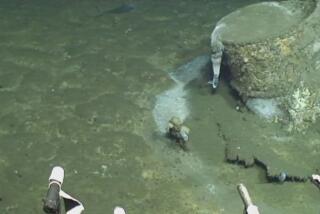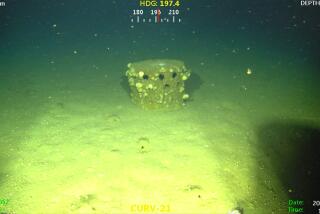GAO Faults Military Policy on Contaminants
- Share via
WASHINGTON — A congressional report released Tuesday found that the military is not taking steps to clean up areas where high levels of the hazardous chemical perchlorate have been found.
The report, by the General Accounting Office, criticized the military for lacking a comprehensive policy for testing and cleaning up perchlorate, a component of fuel used in munitions and rockets, and 19 other chemicals associated with munitions that present serious public health risks.
Perchlorate has infiltrated drinking water supplies in California and other states. The chemical can affect the thyroid gland’s production of hormones that are critical to early childhood development.
The GAO report said the military uses 90% of the perchlorate produced in the United States. The report was released as the Pentagon was seeking exemptions from the hazardous-waste laws that gave states and the federal government leverage to force the cleanup of chemicals that present significant public health risks.
“It is irresponsible that the military has chosen not to take steps to monitor for and reduce perchlorate contamination,” said Rep. Hilda L. Solis of El Monte, the ranking Democrat on the House subcommittee on environment and hazardous materials. “The Defense Department must be a good steward where public health is at risk.”
Defense Department officials rejected the GAO’s assessments and defended the Pentagon’s environmental record.
“The report represents an invalid characterization of the department’s environmental efforts at operational ranges,” Alex A. Beehler, an assistant deputy undersecretary of Defense, said in a letter responding to the report.
Specifically, the Pentagon has made efforts to address contaminants from munitions at 23 facilities, Beehler said.
In 2002, Congress responded to a growing concern about the potential health effects associated with environmental contamination caused by munitions by requiring the Defense Department to provide a comprehensive assessment of the problem at current and former military facilities.
The Pentagon estimated that it would cost between $16 billion and $165 billion to clean up contaminants from munitions at 10,444 operational ranges that covered 24.6 million acres of the United States and its territories.
But the GAO report, which was requested by Reps. John D. Dingell (D-Mich.) and Solis, questioned the reliability of the Pentagon’s assessment.
“The inconsistencies in how [the Defense Department] collected and analyzed data on operational ranges raises questions about the reliability of the inventory,” the report said.
Beehler disagreed that the military lacked a comprehensive plan to respond to the problem. He referred to Pentagon plans for the years 2004-09 that call for the military services to “assess potential hazards” from the migration of contaminants from munitions and begin cleanup by 2008.
The GAO visited seven military installations as part of its investigation, including Edwards Air Force Base and the Naval Air Weapons Station at China Lake. At six of the bases, including both of those in California, large amounts of perchlorate had been detected, but no cleanup efforts were underway.
Defense officials “explained that perchlorate is not a regulated contaminant and, therefore, there is no requirement to clean up perchlorate contamination,” the GAO report stated.
Nor is the military cleaning up perchlorate at the Aberdeen Proving Ground in Maryland, where the contaminant is leaching into the city water system, , the report said. The city of Aberdeen tests the water to see if the perchlorate level is higher than the state’s advisory limit, and if it is, that water is blended with uncontaminated water, according to the report.
Under heavy Pentagon influence, the EPA delayed releasing a federal drinking water standard for perchlorate and instead asked the National Academy of Sciences to conduct a study, according to Bush science advisor John Marburger.
“There’s a concerted effort to prevent progress on this issue because cleanup will cost a lot of money,” said Sujatha Jahagirdar, clean-water advocate for Environment California, an activist group. “The Department of Defense should be responsible for cleaning up the pollution they’ve caused.”
Times staff writer Miguel Bustillo contributed to this report.
More to Read
Sign up for Essential California
The most important California stories and recommendations in your inbox every morning.
You may occasionally receive promotional content from the Los Angeles Times.










